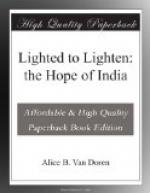(5) for demonstrating the uplifting influence of Christ upon that sex which has been so disastrously ignored and repressed in India, and for proving that the best is none too good for Indian womanhood. ’Better women’ are the strongest factor in the development of a Better India.
(6) for definitely distributing the ideals of Christian womanhood to all parts of Southern Asia from which the College draws its students. Personal witness to the value of Christian education for women is a real Kingdom message.
(7) for training women to take their part in the new national life of awakened India. This training must be by contact with lives already devoted to Christ, more than by precept, for ’character is caught, not taught.’
(8) for meeting the needs of the more educated classes of India, as the evangelistic and other parts of mission work minister specifically to the needs of the masses.”
(9) In furnishing pre-medical training for the hundreds of women who must be educated to follow in the footsteps of the Great Physician.
INTRODUCTION
To say that the world is one is to-day’s commonplace. What causes its new solidarity? What but the countless hands that reach across its shores and its Seven Seas, hands that devastate and hands that heal! There are the long fingers of the cable and telegraph that pry through earth’s hidden places, gathering choice bits of international gossip and handing them out to all the breakfast tables of the Great Neighborhood. There are the swift fingers of transcontinental train and ocean liner, pushing the dweller from the West into the Far East, the man from the prairie into the desert. There are the devastating fingers of war that first fashion and then carry infernal machines and spread them broadcast over towns and ships and fertile fields. Thank God, there are also hands of kindness that dispense healing medicines, that scatter schoolbooks among untaught children and the Word of God in all parts of earth’s neighborhood. And, lastly, there are hands that seem never to leave the house roof and the village street, yet gain the power of the long reach and set thousands of candles alight across the world.
“Why don’t you let them alone? Their religion is good enough for them,” was the classic comment of the armchair critic of a generation ago. Time has answered it. Nothing in to-day’s world ever lets anything else alone. We read the morning paper in terms of continents. To the League of Nations China and Chile are concerns as intimate as Upper Silesia. To the Third Internationale the obscure passes of Afghanistan are a near frontier. Suffrage and prohibition are echoed in the streets of Poona and in the councils of Delhi. Labor strikes in West Virginia and Wales produce reactions in the cotton mills of Madras. And the American girl in high school, in college, in business, in society, in a profession, is producing her double under tropic suns, in far-off streets where speech and dress and manners are strange, but the heart of life is one. That time is past; we cannot let them alone; we can only choose what shall be the shape and fashioning done by hands that reach across the sea.




